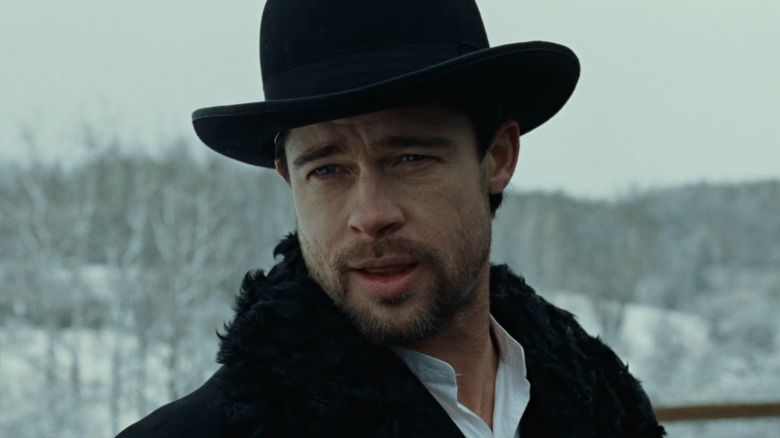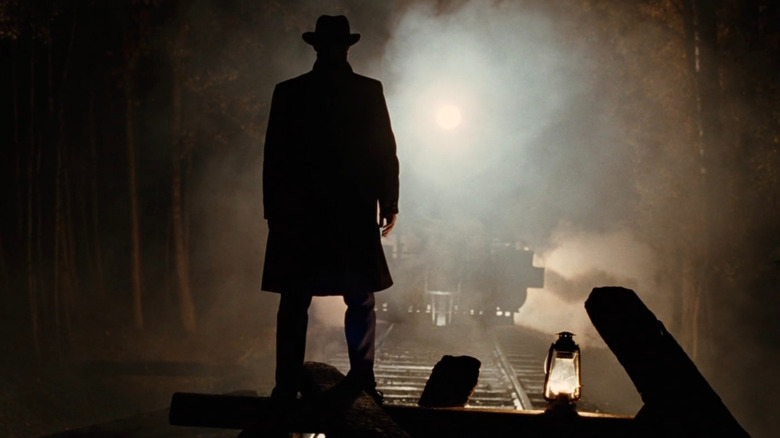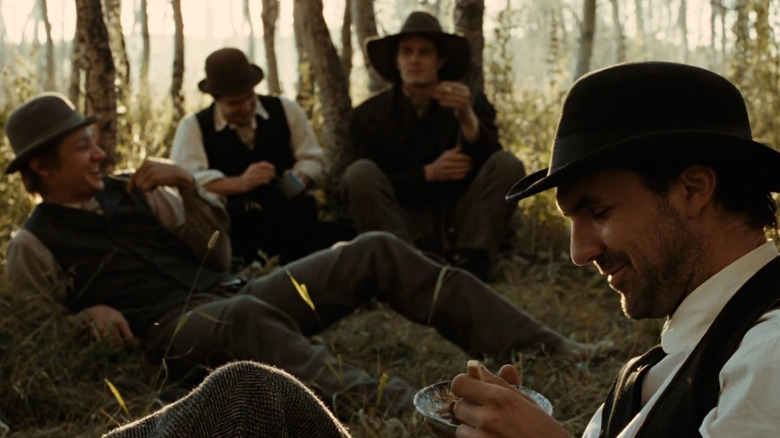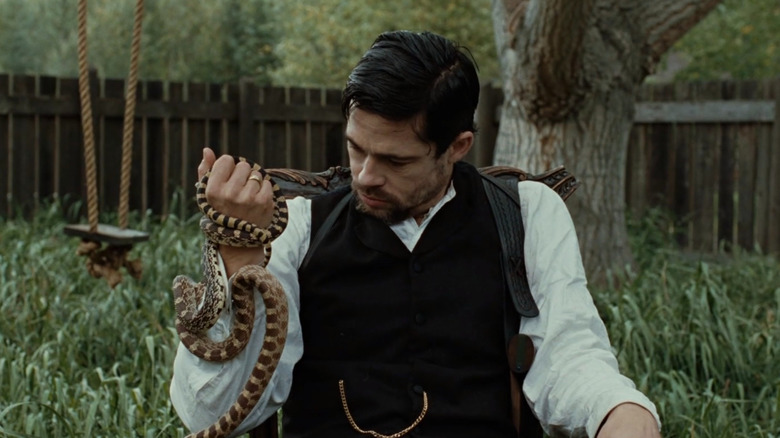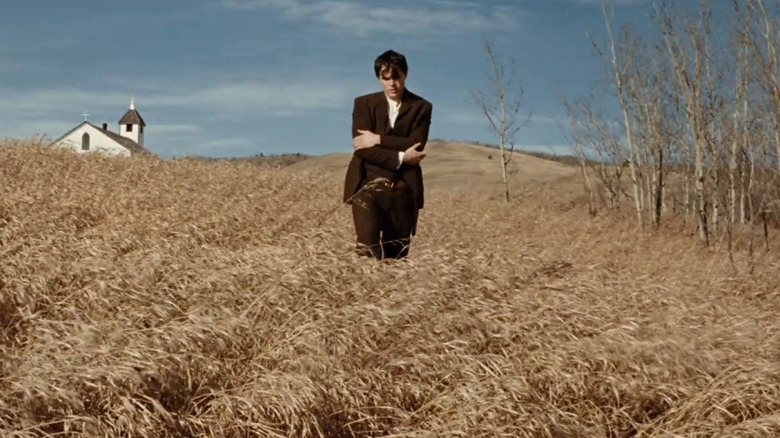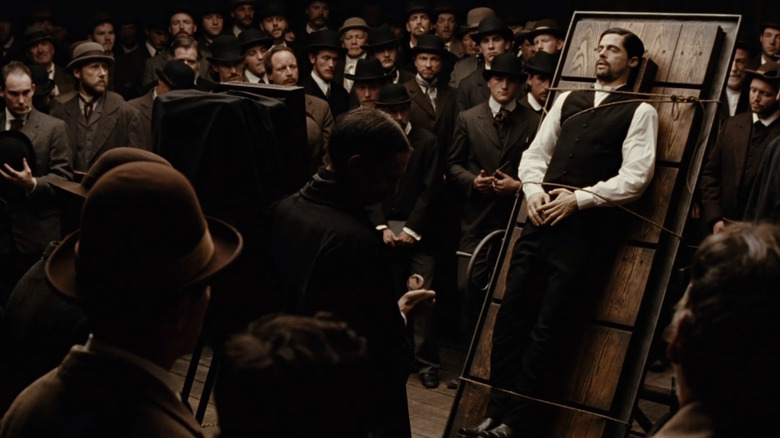One Of The 21st Century's Best Films Comes From The Director Of Blonde, And It Turns 15 Today
Director Andrew Dominik has a new film headed to select theaters, "Blonde," which will walk down the red carpet to Netflix a week from today to become the first NC-17 streaming film ever released. "Blonde" has earned praise for its central Ana de Armas performance, but it's already proving as divisive as Dominik's last non-documentary film, "Killing Them Softly," starring Brad Pitt.
That movie came out ten years ago, while Dominik's filmography dates back even further to 2000 when he made his directorial debut with the Eric Bana-led "Chopper." There was a seven-year gap separating "Chopper" from Dominik's next effort, but his sophomore film was well worth the wait, and it happens to be commemorating its 15th anniversary today.
"Blonde" deals with celebrity and revisionist history — two narrative forces at work in "The Assassination of Jesse James by the Coward Robert Ford," which remains not only Dominik's best film but one of the best of the 21st century thus far.
The Assassination of Jesse James by the Coward Robert Ford
In an episode of the Team Deakins podcast, cinematographer Roger Deakins — who earned an Oscar nomination for his work on the film — revealed that Dominik filled a long corridor in the "Assassination of Jesse James" production office with reference images for every scene in the movie. Deakins likened the effect of these images to "a tone poem" that crew members walking down the corridor would experience.
The film itself has a similar effect, carrying the viewer forward into a succession of beautiful images: magic-hour vistas and blurry-edged vignettes that, through a haze of myth and memory, frame a melancholy tale of idolization gone wrong. It's the kind of thing where the outlaw viewer could easily develop an itchy trigger finger while taking screenshots of "The Assassination of Jesse James by the Coward Robert Ford," same as if you were confronted with one photogenic subject after another in real life.
Among Dominik's reference images were stills from Terrence Malick's "Days of Heaven" (which co-starred Sam Shepard, who plays Frank James here), and Dominik has elsewhere short-listed Malick's "Badlands" as one of the greatest films of all time. You can see that influence as much in the cinematography as in the unapologetic use of voiceover narration from Hugh Ross, who doubled as the film's first assistant editor. It gives "The Assassination of Jesse James" a literary quality befitting its roots as a historical novel by Ron Hansen.
The outlaw's entourage
Robert Ford (Casey Affleck) desires fame. He's got a box of Jesse James stories under his bed and believes he, too, is destined for greatness, but the men around him — de facto members of the James Gang — are made of sterner stuff. These are violent offenders, Southern loyalists, and "petty thieves" with little respect for women and even less respect for who won the Civil War. They joke about Lincoln's assassination, sing anti-Yankee songs, and wear white hoods over their heads in a train robbery where Jesse is backlit as a larger-than-life silhouette who can stop locomotives.
As sparks fly from the braking train, illuminating hooded men in the woods alongside the tracks, it's an image as evocative of the Ku Klux Klan as it is "The Elephant Man." Yet these brigands, embodied by famous faces like Sam Rockwell and Jeremy Renner and recognizable character actors like Garret Dillahunt and Paul Schneider, are described as simple "country rubes" that the James brothers recruited only because the true members of their gang were all now dead or in jail. They're the Western equivalent of a rock star's entourage. Jesse's only real peer is Frank, who is ready to retire.
At age 19, Ford is lowest on the pecking order, the butt of constant jokes among the men. His smiley way of trying to ingratiate himself into the presence of the James brothers reeks of desperation. Frank is so put off by his unctuous manner that he sends Ford away at gunpoint, telling him, "You don't have the ingredients." Out of sheer amusement, perhaps, Jesse is more tolerant of this kid, but when Ford tells him he's read all about his escapades, Jesse undercuts his own myth, saying, "They're all lies, you know."
Superstar and Grim Reaper
In his private moments, Jesse does show vulnerability and regret over what he's become, but his mercurial nature is such that it's as if his men have linked up with the Grim Reaper: a menacing figure with snakes coiling around him who tells bystanders to kneel down and pray before he kills them, or shows up at the cabins of his closest compatriots unannounced and then rides behind them like death itself.
On the train, we witness Jesse casually cold-cock a civilian and almost shoot him in the head, leaving him unshot in a puddle of his blood only after Ed Miller (Dillahunt) pleads for his life. Later, when Jesse recognizes that Ed is plotting against him, he shoots him in the back. Dick Liddil (Schneider) is also sickened by the way Jesse beats up a kid, while Jesse's interactions with Ford and his brother Charley (Rockwell) grow more fraught as he becomes increasingly paranoid.
Heavy lies the crown. This is one of Pitt's best performances, right up there with his Oscar-winning role in "Once Upon a Time in Hollywood" or any of his collaborations with David Fincher. He's got the right star quality, of course, to play "Jesse James Superstar," but his appearance in this movie is also scraggly in a way that makes you believe he could be a real hardscrabble 1880s man.
Everybody wants something from Jesse or expects him to be something. He's surrounded by hangers-on, but he disassociates from their idea of him and even his own actions (speaking of himself in the third person when he confesses his murder of Ed to Charley). He also sees right through them and their unspoken grudges, the resentments that fester below their adulation.
The Robert Ford effect
Ford fancies that he and Jesse have many things in common; he reluctantly lists them off at the dinner table one night, offering up tenuous connections like the fact that they both have brothers with six letters in their name. At one point in the movie, Jesse says, "I can't figure it out: you wanna be like me, or you wanna be me?"
By the end of the movie, Ford becomes a bit of both — a self-made victim of the same cycle of deification, demonization, and eventual deicide that goes part and parcel with the dark side of fandom and idol worship. "Ever since I could remember it, Jesse James has been as big as a tree," Ford says, and it's a tree he means to cut down.
"The Assassination of Jesse James by the Coward Robert Ford" shows how easily admiration slips into indignation and celebrity turns to notoriety. Without naming any names, it's enough to say that there are any number of movie and TV franchises you could cite where it's as if fans now seek to kill the thing they once loved. Ford does it with the very gun Jesse gifted him, but not before poking around Jesse's empty cottage, inventorying his clothes, trying on his hat, sipping from his water glass, crawling into his bed, and holding his hand up to the window's natural light, watching the dust motes swirl around his imitated missing half-finger.
"I been a nobody all my life," Ford says. "I was the baby. I was the one they made promises to that they never kept." This sense of entitlement he feels — that conviction that he was promised something — becomes a black hole inside of him, eating up his hero Jesse, his brother Charley, and finally, Ford himself.
'All America thinks highly of me'
One of the most interesting things about "The Assassination of Jesse James" is how it ends, not with the titular assassination — Jesse's promised death — but with Ford's. So often, the third act of a movie is devoted to a big confrontation, but in this one, it's all about Ford confronting himself. The movie shows the full consequences of his actions, how he initially profits from his fame-seeking misdeeds, only to have them eat away at him and see his name become a byword for betrayal and cowardice.
Ford is obviously a Judas figure (Jesse willingly offers himself up for death the day after Palm Sunday, and it's mentioned that Ford read about the funeral proceedings on Good Friday), but his brother is the one who suffers the Judas fate. On stage, Ford is left to reenact his crime, again and again, but he's able to live with the guilt better and even find companionship with a fellow stage performer, Dorothy Evans (Zooey Deschanel). "By his own approximation, Bob assassinated Jesse over 800 times," the narrator says. "He suspected no one in history had so often and publicly recapitulated an act of betrayal."
For his part, Jesse, who once said, "All America thinks highly of me," becomes a macabre circus attraction, commodified as much in death as he was in life. His corpse is exhibited on ice, and we see it reflected in the camera lens before Dominik and Deakins show us the crowd of onlookers gathered around it. How many of us are them?
With music by Nick Cave and Warren Ellis, "The Assassination of Jesse James by the Coward Robert Ford" remains a spellbinding watch with much to say about the complications that arise when we realize our idols are false, just like us.
